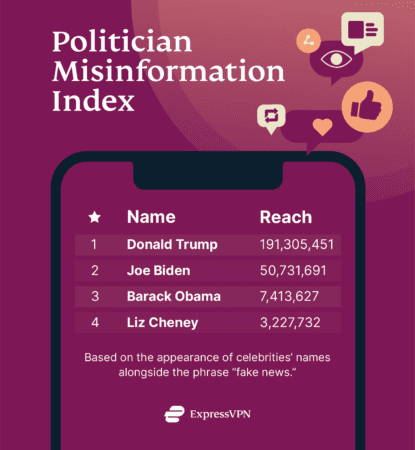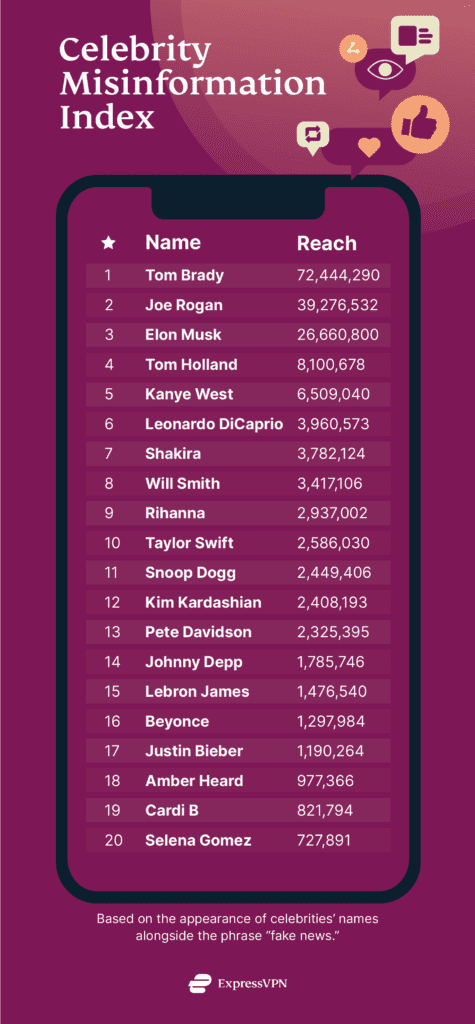
Tom Brady isn’t moving to the Miami Dolphins. Taylor Swift didn’t announce that she’s pregnant. Tom Holland is very much alive.
Unless you’re reading fake news, that is.
With unreliable news sources gaining more traction than ever before, we uncover the celebrity names most associated with fake news in 2022.
But first, what exactly is fake news?
Defined as fabricated information that mimics legitimate news, fake news is distributed with the sole purpose of deceiving readers into believing it’s an accurate reflection of certain events. And with social media, fake news can spread faster than ever before.
(This is one reason it’s important to have access to all information—and a VPN download can help with that by letting you break through censorship.)
But the reasons for the phrase “fake news” to appear in a given post could vary widely. It could show up in reference to a news item or an observation that is in dispute. It could even simply be used as a joke. We shouldn’t assume every mention of “fake news” is indeed about deliberate deception.
Top 10 celebrities associated with ‘fake news’ in 2022
We used Linkfluence—a platform that specializes in monitoring online conversations—to uncover which celebrities, politicians, and other public figures were mentioned the most on social media alongside the phrase “fake news.”
While being associated with fake news comes with the territory of being famous—sometimes, even benefiting celebrities who are looking to garner publicity and attention—more often than not, it puts them in a negative light.
Here are some of our findings, including how many people were exposed to “fake news” posts about the stars in question.
Tom Brady was most associated with “fake news”
Tampa Bay Buccaneers quarterback Tom Brady takes the crown as the celebrity whose name has been most associated with fake news in 2022. In fact, posts mentioning him alongside the phrase “fake news” were seen by a whopping 72,444,290 people from January to October, the period studied.
And, with coverage being fueled about his recent divorce announcement from the supermodel Gisele, the state of his fortune after a recent crypto collapse, and rumors about when he might retire, it’s only natural that news stories—true or not—will continue to circulate around one of the U.S.’s biggest sports stars.
Second place on our celebrity fake news list goes to podcaster Joe Rogan. "Fake news" posts associated with the host reached 39,276,532 people online. Rogan, who is best known for his podcast The Joe Rogan Experience, has interviewed numerous controversial figures and received plenty of attention earlier this year when Spotify removed 70 of the show’s episodes for insensitive language.
Rounding out our top three is SpaceX founder, Tesla CEO, and Twitter owner Elon Musk—whose name was mentioned with “fake news” in posts reaching 26,660,800 people. The world’s richest man has made various controversial moves this year, including his flip-flop regarding the acquisition of Twitter and his subsequent employee layoffs.
Tom Holland comes fourth, followed by Kanye West
The first actor on the list is Spider-Man star Tom Holland, in fourth place. The biggest 2022 news around the English actor revolved around his relationship with his girlfriend and Spider-Man co-star Zendaya. The pair decided to actively shun the spotlight, leading to speculations that they’d broken up.
It’s also worth mentioning the more bizarre fake news piece claiming that Holland had frozen to death after falling into a well in July this year. While the death news is clearly untrue, the simplicity and rapid spread of the rumor is a prime example of how easy it is for fake news to crop up.
It’s hardly surprising that Kanye West took fifth place for being associated with fake news. The rapper and fashion designer faced intense criticism for antisemitic comments and for voicing conspiracy theories.
Although industry news around Leonardo DiCaprio has been relatively slow this year, his private life dominated headlines after he broke up with his model girlfriend just weeks after her 25th birthday, which is likely what propelled him to sixth place for “fake news” posts.
Closely following on the fake news leaderboard is Shakira at seventh—likely triggered by her breakup with Spanish football legend Gerard Piqué. Add that to the recent Spanish tax fraud allegations dogging the Colombian singer, and we can only expect dubious news about Shakira to continue to spread well into 2023.
Actor Will Smith and singers Rihanna and Taylor Swift take the final three spots on our Top 10 list. Smith slapping Chris Rock at the Oscars and Rihanna giving birth to her first child likely acted as sources of inspiration for misinformation, or at least raised a lot of questions. Swift, meanwhile, continued to be arguably the world’s biggest pop star, drawing fire for everything from her private jet use to commentary about whether she writes her own songs.
Last 3 U.S. presidents top politicians’ ranking
Once considered respected sources of information, the news media and politicians are no longer seen as trusted. It seems that the more polarized society has become, the more the term “fake news” has been slung by each side.
This year, four U.S. politicians in particular were associated with the phrase “fake news.”
 Donald Trump arguably popularized the concept of fake news during his presidency, so it shouldn’t come as a surprise that he tops our list of politicians who are most associated with the term. The research shows that 191,305,451 people have come across such posts centered on the former president.
Donald Trump arguably popularized the concept of fake news during his presidency, so it shouldn’t come as a surprise that he tops our list of politicians who are most associated with the term. The research shows that 191,305,451 people have come across such posts centered on the former president.
Next on the list is current U.S. president Joe Biden, whose associated “fake news” posts have reached 50,731,691 people online. Barack Obama and congresswoman Liz Cheney have come in third and fourth, respectively.
How is fake news harmful?
Fake news makes the truth hard to find. While some misinformation is seemingly harmless, and can even be brushed off as baseless gossip, other fake facts can be damaging, malicious, and even dangerous for the people it mentions, and the ones who believe fake news to be fact.
Here are a few of the negative consequences that emerge as a result of the rapid spread of fake news online:
- Creates distrust in society: Fake news makes people lose faith in traditional sources of truth, such as the news media and government authorities. It makes people more susceptible to embracing conspiracy theories.
- Alters perception: Fake news can easily be mistaken for reality, which can negatively impact a person’s perception of public figures, celebrities, and events . It can also create confusion and misunderstanding around important social and political issues.
- Warps beliefs: One of the main reasons fake news is created is to change people’s beliefs. If you take fake news to be true, your decisions are likely being driven by someone else’s agenda.
- Spreads false or discredited science: As we’ve seen during the Covid-19 pandemic, fake news can widely influence public health.
- Could impose physical danger: If a person’s private details, like their work or home address, are leaked along with fake news, it could put them in physical danger.
How to spot fake news
Because fake news is often spread through fake websites that look like the real deal, and shared on legitimate social media sites, it's easy to fall victim to it. A mindless retweet here, and a quick share there, means it’s easier than ever to inadvertently contribute toward spreading misinformation.
Here are six tips to help you identify fake news so that you end up thinking twice before you share.
Ask questions
When you find a juicy or shocking piece of information online, before you hit the share button, ask yourself the following questions to ensure you’re not spreading fake news:
- Who/which organization is spreading the news?
- Could the information be biased?
- Have I double-checked the facts before sharing this piece of information?
- Does this match the person’s interests or previous news stories about them?
Fake news creators rely on believers sharing their false agenda. If you’re not sure whether the information is authentic or not, err on the side of caution and don’t share it. If the information is legitimate and newsworthy enough, more credible sources will pick it up eventually.
Don’t rely on social media alone
Keeping abreast of the latest news is important. However, far too many people rely on social media as their sole news source.
While legitimate outlets do share credible information on their social pages, social media platforms have become a breeding ground for misinformation, with fake news spread across numerous profiles.
If you find an interesting tidbit of information on social media, make sure you compare it to a news source you trust to confirm its validity.
Verify the source
Never take what you read online at face value; double check the source by researching whether other media outlets are reporting on the same story.
For example, if you see that a certain celebrity is trending on Twitter for allegedly making racist remarks, Google whether a reputable news source is covering the facts so that you can corroborate the story. If you can’t find any additional information other than what you see on Twitter, the allegations are likely false.
Read the comments
Links or comments posted in response to a news piece can sometimes be auto-generated by bots or people tasked with spreading misinformation. But they can also be revealing of the truth or offer clues that more digging is needed.
Use a fact-checking site
There are a number of websites that offer political and non-political fact-checking services. The most well-known ones include factcheck.org, Snopes, and PolitiFact. However, even when using a fact-checking site, it’s important to question whether the findings are biased.
Methodology
We first determined the most searched-for celebrities online, then used social-listening data to find out how often their names had been posted (on social media, forums and comments) alongside the phrase “fake news,” from January to October 2022. We then ranked the celebrities based on the reach of these posts, including reposts. Reach is the number of users exposed to the posts.
We've also produced rankings based on number of posts, number of posts including reposts, impressions (potential number of times posts were displayed), and engagement (number of actions such as likes, retweets, comments, shares, favorites).
Take the first step to protect yourself online. Try ExpressVPN risk-free.
Get ExpressVPN





